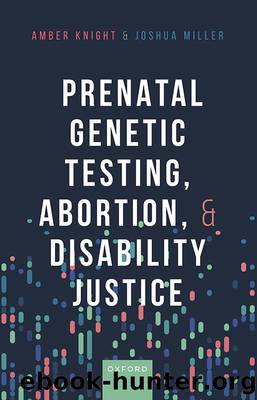Prenatal Genetic Testing, Abortion, and Disability Justice by Knight Amber;Miller Joshua;

Author:Knight, Amber;Miller, Joshua; [Amber Knight and Joshua Miller]
Language: eng
Format: epub
Publisher: Oxford University Press, Incorporated
Published: 2023-02-18T16:25:16+00:00
As she describes it, epistemic humility requires physicians to be open to multiple forms of inquiry and knowledge, including subjective testimonies, in a collaborative project of knowledge production. An ethos of humility can curb the all-too-common tendency among clinicians to undermine the epistemic authority of people with disabilities and their family members.
State-funded medical schools can facilitate a culture of epistemic humility by including disability training in their standard curricula. The Association of American Medical Colleges (AAMC) has recommended that medical schools create specially designed curricula to teach disability cultural competency. However, it is ultimately up to faculty and administrators to decide whether or how to do so, since these measures are encouraged, but not required, for accreditation and licensure. The result is that medical schools vary greatly in the content and delivery of their disability curricula and training (Crossley 2015; Santoro et al. 2017). Disability cultural competency is completely overlooked at some medical schools, though a notable few have begun formally implementing disability training in their programs. The approach developed at the Jacobs School of Medicine and Biomedical Sciences at the University of Buffalo is especially promising. Integrated over four years of medical training and consisting of formal lectures, interviews, and clinical rotations, the program culminates in a four-week elective course in which students meet patients with disabilities and their families as well as patient advocacy groups and community organizations (Symons, McGuigan, and Akl 2009). By inviting people with disabilities and their families to share their own narratives, such programs recover the epistemic value of testimony while inculcating an ethos of humility among early-career physicians. As one student wrote in a reflective piece following an encounter with disabled patients and their families: âThis was the first step in opening our eyes to the necessity of being able to fully understand what it means to care for those that may have an impaired ability to care for oneselfâ (Symons, McGuigan, and Akl 2009: 78). While this specific approach may not work for all medical schools, we nevertheless argue that state-funded medical schools should be incentivized or even required formally to integrate a requirement for curriculum on disabilities into its accreditation standards.19
Second, we encourage lawmakers to reassess and/or repeal conscience clauses, especially those that permit physicians to restrict patientsâ access to the balanced information necessary for decisional autonomy. Having rapidly expanded in the wake of Roe, most existing conscience clauses are vaguely written and deeply problematic for patients attempting to make autonomous decisions about their reproductive health. Troublingly, many women may not even realize that their healthcare provider or institution has policies against certain procedures related to reproductive careâincluding abortionâuntil it is too late for them to choose another provider (Swartz 2006: 289). At a minimum, physicians have a duty to inform patients of any personal convictions that may inform their approach to care, thereby allowing patients to decide as early as possible whether to continue the relationship. As Holly Lynch (2008: 217â18) suggests: âRevelation of a potential mismatch will allow the
Download
This site does not store any files on its server. We only index and link to content provided by other sites. Please contact the content providers to delete copyright contents if any and email us, we'll remove relevant links or contents immediately.
The Secret History by Donna Tartt(18151)
The Social Justice Warrior Handbook by Lisa De Pasquale(11950)
Thirteen Reasons Why by Jay Asher(8447)
This Is How You Lose Her by Junot Diaz(6430)
Weapons of Math Destruction by Cathy O'Neil(5824)
Zero to One by Peter Thiel(5487)
Beartown by Fredrik Backman(5348)
The Myth of the Strong Leader by Archie Brown(5236)
The Fire Next Time by James Baldwin(5015)
How Democracies Die by Steven Levitsky & Daniel Ziblatt(4950)
Promise Me, Dad by Joe Biden(4907)
Stone's Rules by Roger Stone(4852)
100 Deadly Skills by Clint Emerson(4684)
A Higher Loyalty: Truth, Lies, and Leadership by James Comey(4546)
Rise and Kill First by Ronen Bergman(4542)
Secrecy World by Jake Bernstein(4387)
The David Icke Guide to the Global Conspiracy (and how to end it) by David Icke(4376)
The Farm by Tom Rob Smith(4320)
The Doomsday Machine by Daniel Ellsberg(4241)
